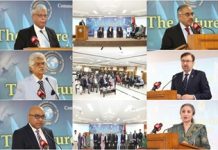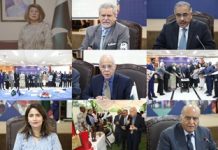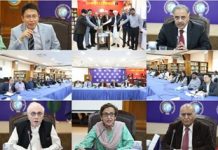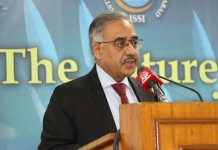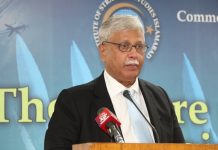Remarks
By Mr. Rahmat Hindiarta Kusuma, Indonesian Chargé d’Affaires
on seminar of the Bandung Spirit: Seven Decades of Solidarity, Sovereignty and South-South Cooperation
ISSI-Islamabad, 30 April 2025
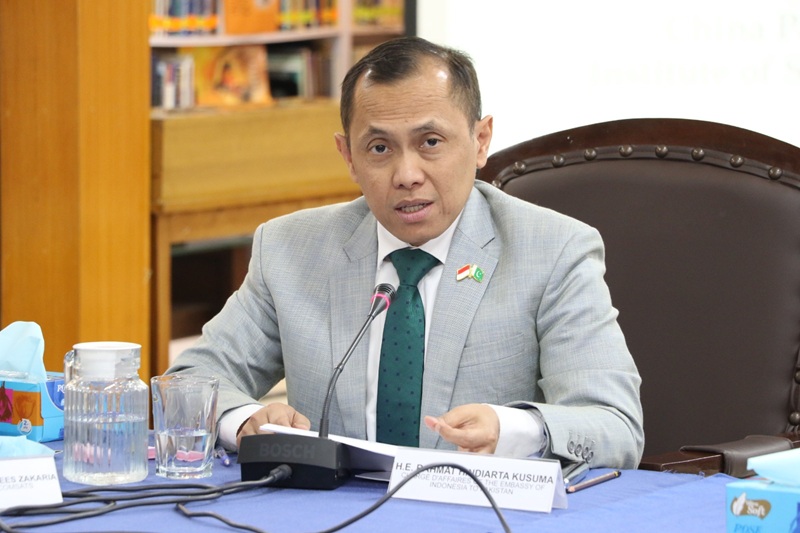
Bismillaahirrahmaanirrahiim
Assalamu’alaikum Warahmatullaahi Wabarakaatuh
- Honorable Senator Mushahid Hussain
Excellencies/Respected Speakers;
- Ambassador Khalid Mahmood, Chairman, Board of Governors, the Institute of Strategic Studies Islamabad (ISSI)
- Ambassador Sohail Mahmood, Director General of the ISSI
- Ambassador Zamir Akram, Pakistan’s former Permanent Representative at the United Nations Geneva
- Ambassador Dr. Mohammad Nafees Zakaria, Executive Director COMSATS
- Salma Malik, Associate Professor at Dept of Strategic Studies, Quaid Azam University Islamabad
- Talat Shabbir, Director of China-Pakistan Study Centre, ISSI
Excellencies, Distinguished Guests,
Ladies and Gentlemen,
I feel honored, humbled, and happy at the same time to be before this distinguished seminar to commemorate the 70th Anniversary of the Asia Africa Conference. My sincere thanks to our colleagues from ISSI and its partners for making the seminar possible on the lasting legacy of the Conference, the Bandung Spirit: Seven Decades of Solidarity, Sovereignty, and South-South Cooperation.
This is indeed a momentous and joyous occasion. Seventy years is not just a number. It is a testament that the Bandung Spirit remains relevance and even very critical in our world today that is experiencing immense flux, uncertainty, polarization, and shifts in global power structure.
The Asia Africa Conference held in Bandung on 18-24 April 1955 was organized only 10 years after Indonesia proclaimed its independence. It was not only a historic event in Indonesian foreign policy but also an evidence that contribution to the world peace and justice has been DNA in the Indonesian diplomacy since the beginning.
The most important thing was that the Conference ended with great success, both in uniting stances and formulating the outlines of cooperation between Asian and African nations.
When the conference held, the world was still recovering from war and uncertainty. The global order was fragile, and many nations stood alone in navigating a fragmented world.
Yet, amid such uncertainty, they believed in partnership grounded in respect for fundamental human rights, respect for the sovereignty and territorial integrity, recognition of the equality of all, non-interference, mutual respect, settlement of all international disputes by peaceful means, Promotion of mutual interests and cooperation, and respect for justice and international obligations, which are called by Dasa Sila Bandung or 10 Bandung Principles and also are well-known by the Bandung Spirit.
The main message was clear: the age of colonialism and imperialism must give way to an era of collaboration and cooperation: where all nations have equal opportunity to prosper; and where all have the rights to development.
Nowadays, in a world filled with uncertainty, where trust is eroding and global cooperation is fading, more than ever, we must reaffirm our commitment to the Bandung Spirit.
Excellencies, Distinguished Guests,
Ladies and Gentlemen,
The end of World War II in August 1945 did not mean the end of the hostile situation among the nations of the world. In some parts of the world there were still problems and new problems emerged. Even some of those problems remain unresolved up to date even more complicated for comprehensive and just resolution.
Colonization experienced by countries in Asia and Africa has been a crucial problem since the 15th century. Although since 1945, many countries, especially in Asia, have gained their independence, but there were still many other countries fighting for their independence.
At that time, several independent Asian-African countries also still faced many problems left over from colonialism and imperialism, such as Indonesian Papua, Kashmir, Aden, and Palestine, as well as countless border disputes among countries. In addition, conflicts between community groups within the country have been still raging due to the colonial politics of divide et impera, or divide and rule!
Looking at the Bandung Spirit through the lens of conflict resolution, collective actions are needed in resolving all international disputes by peaceful means, such as negotiations, agreements, arbitration or other peaceful means, according to the choice of the parties concerned in accordance with the UN Charter.
With this spirit in our mindset, the Global South should act as one as bridge builder for peace creation. We should then promote inclusivity and embrace the Global North to come into our action; promotion of peace and justice.
Indeed, the Global South and the Global North shall work together in creating and maintaining peace and security in the global stage, since both live in the same globe with opportunities, challenges, and risks.
As the Chinese saying goes: “Tong zhou, Gong ji”: we cross this river in the same boat, together.
Excellencies, Distinguished Guests,
Ladies and Gentlemen,
Behind the success of the Conference in Bandung, we may take a historical moment of reflection to look back in time when the representatives of the three nations of the South Asian Region took seats together, to co-sponsor the Conference. They were:
Excellency Sir John Kotelawala, Honorable Prime Minister of Ceylon (now Sri Lanka)
Excellency Mohammed Ali Bogra, Honorable Prime Minister of Pakistan
Excellency Jawaharlal Nehru, Honorable Prime Minister of India
All of the three prominent figures from the South Asian Region discussed preparation of the Asia Africa Conference in term of logistics and critical issues with their counterparts; Excellency Ali Sastroamodjojo, Honorable Prime Minister of Indonesia and Excellency U Nu, Honorable Prime Minister of Burma.
It was an excellent track record for the three representatives to sit together despite existing differences between Pakistan and India. Indeed, differences did not make both countries absent in keep contributing to the world peace.
Despite changes, with reference to the very positive track records from Pakistan and India in co-sponsoring the successful Asia Africa Conference 1955 which helped ignite the Non-Aligned Movement later on, we believe that the two countries have spirits in addressing the differences and resolving the disputes, in peaceful manners.
We do hope that the two brotherly countries for Indonesia, will do their best in reducing tension and start much better peaceful coexistence to maintain peace and security in the region and the world.
Excellencies, Distinguished Guests,
Ladies and Gentlemen,
Let our gathering today convey message, that despite regional and global differences, we are united and refrain ourselves from hostilities. We choose peaceful settlement among ourselves. We promote solidarity, and we will elevate strategic trust among ourselves, for a betterment condition for the world peace and regional stability.
I thank you
Wallaahul Muwaffiq ilaa Aqwamith Thariq
Wassalaamu’alaikum wr.wb.




